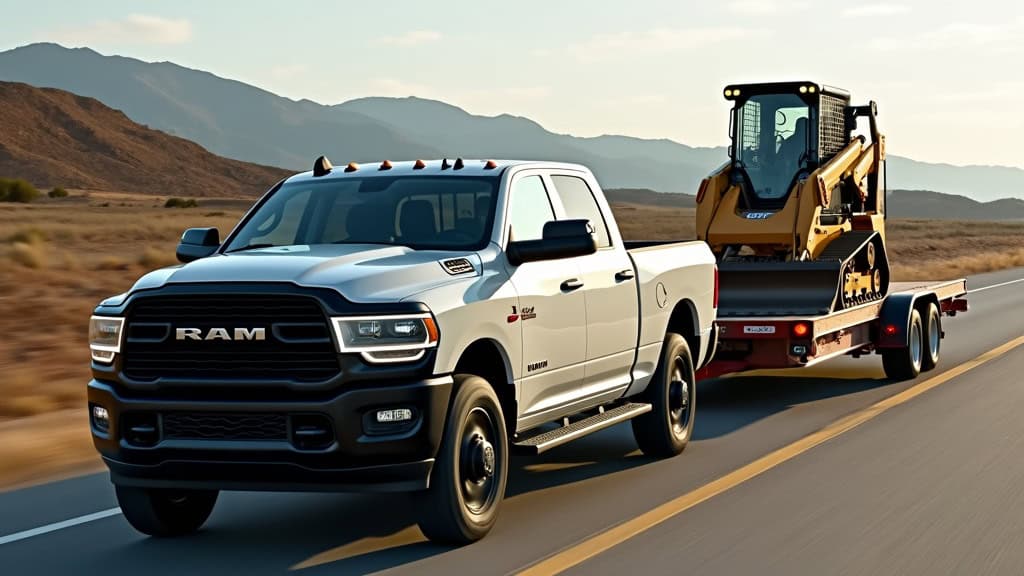Business
How to Choose the Best Trailer for Your Equipment
Table of Contents
- Assess Your Hauling Needs
- Understand Trailer Types
- Consider Trailer Materials
- Evaluate Axle Configurations
- Check Weight Capacity
- Inspect Safety Features
- Factor in Towing Vehicle
- Budget and Maintenance
Reliably transporting heavy machinery, landscaping gear, or industrial tools depends on pairing your load with the right trailer. The vast variety of options can feel overwhelming, but starting with an understanding of your needs and knowing what features to prioritize can make the process straightforward. Whether you are a small business owner, a warehouse professional, or an independent contractor, selecting the right trailer can significantly impact your ability to work efficiently and protect your assets in transit. If you operate in a warehouse or regularly move equipment between job sites, a dedicated warehouse trailer crafted for industrial loads can maximize efficiency and safety while minimizing downtime and damage. Investing in the proper trailer can also lead to substantial savings over time by preventing excessive wear on your equipment and improving turnaround on moving jobs.
The right trailer both protects your valuable assets and streamlines transport logistics, offering peace of mind that your equipment will arrive safely regardless of weather or road conditions. From open-deck flatbeds to secure, enclosed options, the perfect fit combines functionality, safety, and long-term value. Proper selection leads to fewer breakdowns, reduced insurance claims, and greater satisfaction from both clients and team members. This guide walks you through a step-by-step process for making a confident, informed decision, ensuring your investment will serve your business effectively for years to come.
Assess Your Hauling Needs
Before exploring specific models, detail the type, size, and weight of the equipment you’ll be moving. Are you mainly transporting compact construction machinery, power tools, or perhaps fragile appliances? Different jobs demand different solutions: a contractor routinely transporting compact excavators will have different requirements than a landscaper moving zero-turn mowers or a business owner needing to relocate palletized goods. Consider any potential growth in your business or diversification of your load types, which may require a more versatile setup for lasting value. It’s important to anticipate not only the average size and weight of your cargo, but also the scenarios where you might need to move something larger or odd-shaped.
Evaluating your typical transport routes, such as urban streets, highways, or rougher terrain, will help you decide on features like ground clearance or the need for reinforced decks. Consulting your team and reviewing past jobs will also provide a clearer understanding of your average hauls, saving you from outgrowing your trailer prematurely and having to invest in another one sooner than expected.
Understand Trailer Types
The trailer market covers a wide range of needs, and understanding the differences ensures you pick one tailored to your work:
- Flatbed Trailers: Ideal for large, heavy, or oddly shaped equipment that requires easy loading from any angle. Their open design boosts versatility but offers less protection from the elements, making them ideal for rugged, weather-resistant machinery and tools. Flatbeds are particularly popular in construction, agriculture, and large-scale landscaping due to their ease of use and ability to accommodate a wide range of loads.
- Enclosed Trailers: Prioritized when security and protection from weather are key, ideal for valuable, delicate, or theft-prone goods. These trailers serve as mobile storage units, providing users with greater peace of mind when expensive equipment or tools must be left overnight at a job site. They also provide shelter from the elements, keeping loads safe from rain, dust, or theft.
- Dump Trailers: Equipped with hydraulic lifts, these trailers are designed for handling loose materials such as sand, gravel, or debris, allowing for rapid unloading at the job site. Perfect for construction or landscaping, they save labor time and protect workers from injury by automating the heavy lifting.
Choosing the best match often means balancing protection, ease of use, and load requirements. While open trailers provide accessibility and cost savings, enclosed options justify their price with enhanced security.
Don’t forget to consider specialized trailers—such as tilt trailers for loading wheeled machinery, or gooseneck styles for heavy-duty hauling—if your needs are highly specific. Picking the wrong trailer type can lead to inefficiencies or even damage, while the right choice will maximize your ROI.
Consider Trailer Materials
The trailer’s construction material dramatically affects its durability, weight, and longevity. Steel remains the standard for ruggedness and load strength, making it the preferred choice for demanding heavy-duty applications. However, it can rust and is heavier to tow, which affects fuel economy and increases wear on your truck or van. Galvanized or powder-coated steel resists corrosion but may come with a higher upfront cost.
Aluminum trailers excel for those prioritizing weight savings, corrosion resistance, and lower maintenance. These are ideal for operators in coastal or high-humidity environments, where rust is a significant concern. Aluminum also puts less strain on the towing vehicle, potentially boosting fuel efficiency. Evaluate your climate, how much you haul, and long-term ownership costs when weighing material options. Investing in the right construction can extend the life of your trailer and help maintain its high resale value if you need to upgrade later.
Evaluate Axle Configurations
Axle type shapes both load stability and maneuverability:
- Single Axle: Easier to maneuver and ideal for lighter payloads or urban environments, where tight turns and easy parking are priorities. These trailers generally require less maintenance due to having fewer tires and brakes.
- Tandem Axle: Enhances traction, distributes weight more evenly, and provides a smoother ride for heavier equipment, with a built-in backup in case one tire fails. They’re better suited for highway travel at higher speeds, and for heavier loads, the added stability and load distribution can prevent uneven tire wear and reduce the risk of accidents.
If your equipment routinely approaches or exceeds 3,000 pounds, a tandem axle design often provides a safer, more stable solution. The added investment in a tandem axle pays off in peace of mind and increased payload flexibility, which can prevent overloaded or unsafe hauls. Don’t forget to consider braking systems—tandem axles often come with brakes on both axles as a standard safety feature.
Check Weight Capacity
Never overlook the Gross Vehicle Weight Rating (GVWR) of your trailer. This number tells you the maximum permitted weight, including both cargo and the trailer itself. Overloading a trailer not only risks breakdowns and fines but can also create hazardous driving conditions, increasing the likelihood of sway, tire blowouts, loss of control, and mechanical failures. It may also void warranties and insurance policies in the event of an accident.
When in doubt, consult the U.S. Department of Transportation for guidelines on safe hauling and compliance requirements. Most reputable trailer manufacturers provide clear and accessible GVWR information; always double-check before signing a purchase agreement. It’s prudent to leave extra capacity for incidental cargo or unforeseen needs, ensuring long-term usability and compliance with state and federal regulations.
Inspect Safety Features
Modern trailers are equipped with features to minimize risks on the road and at job sites. Prioritize options with:
- Reliable and adequately rated braking systems, such as electric or surge brakes, to shorten stopping distances and prevent jackknifing
- Compliant lighting and reflective tape for visibility, keeping you legal and safe in low-light conditions
- Strong, accessible tie-down points for securing cargo tightly—look for recessed D-rings, stake pockets, or built-in E-track systems for maximum versatility
Regular maintenance and inspections are crucial for keeping safety systems in optimal condition and preventing costly breakdowns or accidents. Check for wear and tear, corroded parts, and electrical issues before each use. Investing in high-quality safety features and maintaining regular inspections demonstrates to clients and employees that you prioritize their well-being.
Factor in Towing Vehicle
Your trailer is only as useful as your towing vehicle’s capacity. Always verify that your vehicle’s manufacturer-approved towing limit meets or exceeds the loaded weight of the trailer. Underestimating or exceeding the towing limit can result in costly repairs, citations, or, in the worst case, dangerous accidents. Install the correct type of hitch and matching brake controller system to guarantee safe, legal, and hassle-free hauling. It’s also important to ensure that your load distribution does not overly stress the rear axle and suspension of your towing vehicle, as uneven weight can reduce handling and braking effectiveness. Consult a professional installer if you are unsure about the compatibility of your towing setup.
Budget and Maintenance
Budget isn’t just about sticker price—factor in required features, long-term durability, servicing needs, and resale value. Higher-quality trailers may require a greater initial investment but pay off through fewer repairs and a longer lifespan, making them a smarter choice for frequent haulers and business owners. Consider additional costs, such as insurance, taxes, registration, and any optional accessories you may need, like spare tires, custom ramps, or security systems.
Routine maintenance—such as checking tire pressures, lubricating moving parts, and removing corrosive debris—will also impact the total cost of ownership. Plan for annual inspections and potential part replacements to keep your investment running smoothly. A well-maintained trailer not only enhances longevity but also increases resale value if you ever decide to upgrade.
Taking the time to assess your needs and research trailer options ensures you invest in equipment that makes operations safer, more reliable, and cost-effective for years to come. Consult with trailer specialists, read customer reviews, and test drive potential purchases before making your decision. A thoughtful investment now brings safety, peace of mind, and operational efficiency well into the future.







